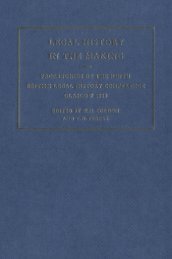130. - Collection Point® | The Total Digital Asset Management System
130. - Collection Point® | The Total Digital Asset Management System
130. - Collection Point® | The Total Digital Asset Management System
Create successful ePaper yourself
Turn your PDF publications into a flip-book with our unique Google optimized e-Paper software.
254 Structure and the Book ofZechariah<br />
of fortunes' theme is noticeable. 1 Nevertheless every word here is<br />
used differently in ch. 14 from ch. 2.<br />
noto. See rn above.<br />
*DJ? occurs in 2.15, 8.7 and (especially) 8.8; this is also the form in<br />
13.9. nrn D#n mRtf occurs in the other three references in ch. 8, but<br />
a similar idea is expressed in different words in 14.2, Din in'. In the<br />
instances underlined above the plural is used.<br />
*?m is used of Yahweh who 'inherits Judah', 2.16, and of the remnant<br />
of this people: 'all these things', 8.12. ehpn noiR is found in<br />
2.16; inmK in 9.16 is comparable, but no more; in 13.5 it refers to the<br />
ground. Ehpn "in, 8.3, is similar to the expression in 2.16; iBhp ]U>n,<br />
2.17, is slightly less so. Zech. 14.5 refers to the holy ones; 'Holy to<br />
Yahweh' is the inscription on the bells, and applies also to the vessels<br />
in the temple (14.20-21). 2 <strong>The</strong> use of iftn in 2.17 is completely<br />
different from all the other occurrences.<br />
TII> represents waking from sleep (4.1), 'brandishing' (9.13), blindness<br />
(]Tf\a) (12.4), as well as 'stir into action' (2.17; 13.7; niphal and<br />
qal respectively). <strong>The</strong> last two represent Yahweh's action, but the mode<br />
of expression is very different. However, despite these disappointments,<br />
there are some clear pointers.<br />
<strong>The</strong> most striking phrase of this section is '<strong>The</strong>n/and you shall know<br />
that Yahweh has sent me to you' (2.13, 15; 4.9; 6.15) together with<br />
the 'sent me' of 2.12. It is obvious that it is the final redactor of<br />
Zechariah 1-8 who is responsible for this phrase, and that he intends<br />
it to be noted. It is not only repeated four times, but the first two<br />
occurrences frame the promise that Yahweh will dwell in the midst of<br />
his people and many nations will be his people (cf. the section in<br />
Chapter 2 above on 2.10-17).<br />
JIDX is specially emphasized in 6.8 (twice) after being mentioned<br />
along with the west and the south in v. 6. <strong>The</strong> north was traditionally<br />
the place from which the enemy came, and the place of other gods. I<br />
wonder if we are meant to notice that, in 6.10, the exiles from<br />
1. This partly depends on how 14.1 is understood. Does it mean that Jerusalem<br />
will get its own plunder back? <strong>The</strong> consensus view is that Jerusalem will suffer the<br />
humiliation of seeing its enemies divide up the plunder in the city itself (Baldwin,<br />
Haggai, Zechariah, Malachi, p. 200; Mason, Haggai, Zechariah andMalachi, 1977,<br />
p. 124; Rudolph, Haggai, p. 234).<br />
2. <strong>The</strong> Meyers' (Haggai, Zechariah, p. liii) put 'holy mountain' as a correspondence<br />
between 2.17 and 8.3, but this is not strictly true.






